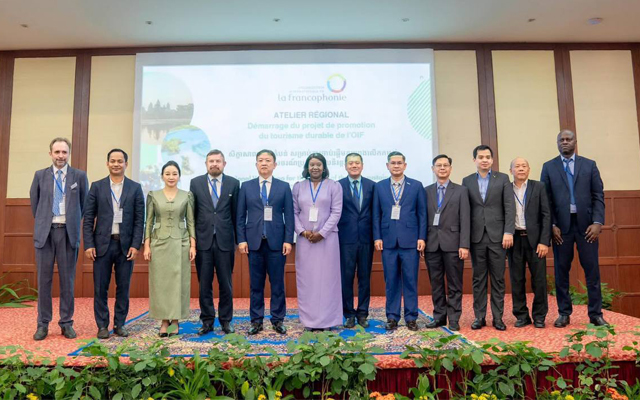A pilot project aimed at developing sustainable tourism, with a focus on empowering women, youth, and rural communities, has been launched in Cambodia and Vietnam under the Organisation Internationale de la Francophonie (OIF) Destination Eco-Talents (DET) initiative.
From March 26 to 28, the OIF organised a workshop for the DET project in Siem Reap, Cambodia, a pilot country for the initiative designed to promote sustainable and inclusive tourism.

Adjara Diouf, project coordinator at REPAP/OIF, said the project is the result of studies – led by Millennium Destination – conducted in Cambodia, Vietnam, the Comoros in the Indian Ocean and Cabo Verde in West Africa.
“The results have shown a strong potential to develop sustainable and inclusive tourism. DET aims to strengthen competitiveness in the tourism sector, including women, young people and local communities,” she said, adding that the pilot project will run until 2027.
“The objective is to have more solidarity and a better tourism space. We want to develop more sustainable tourism for local, rural and suburban communities, as they’re often excluded from decision-making in tourism value chains. Nobody is left behind in this project.”
Education, training, and enhancing the professionalism of tourism stakeholders are key priorities, alongside developing and promoting sustainable tourism offerings to boost the attractiveness and competitiveness of local initiatives. Another objective is to foster strong networks among relevant players to strengthen regional efforts, with the goal of improving cross-border tourism coordination.
As part of the project, DET Centres will be set up in the pilot countries, including Siem Reap. These centres will feature spaces for training and raising awareness about sustainable tourism, as well as areas to promote locally-produced products.
“We will also do a lot of awareness outreach about sustainable tourism. This is a long-term process,” Diouf shared, adding that the DET centres will serve as information centres for sustainable tourism, providing details about ongoing initiatives in the area, with the aim of improving the skills of youth to match local needs and strengthen competitiveness in the tourism sector.
Dee Suvimol Thanasarakij, executive director of Mekong Tourism Coordinating Office (MTCO), noted that the tourism sector contributes a major chunk to the region’s gross domestic product (GDP), with developing sustainable and inclusive tourism key to ensuring the sector’s future.
Commenting on why sustainable tourism matters, Thanasarakij said: “We want to make sure that what we have today is left for the next generation. We want to make sure our children live in a better world.”
She added that MTCO has been developing the GMS Tourism Strategy 2030, which will launch in June to provide a comprehensive roadmap to develop the Greater Mekong Subregion (GMS) into a premier global destination, recognised for “high-quality sustainable tourism experience that fosters inclusive, resilient and sustainable development”.
“Tourism contributes a large percentage of GDP in this region. At the same time, while we enjoy the economic benefits, we want to make sure it doesn’t harm our environment, local culture or where we’re living. We need to keep a balance,” she stated.


















